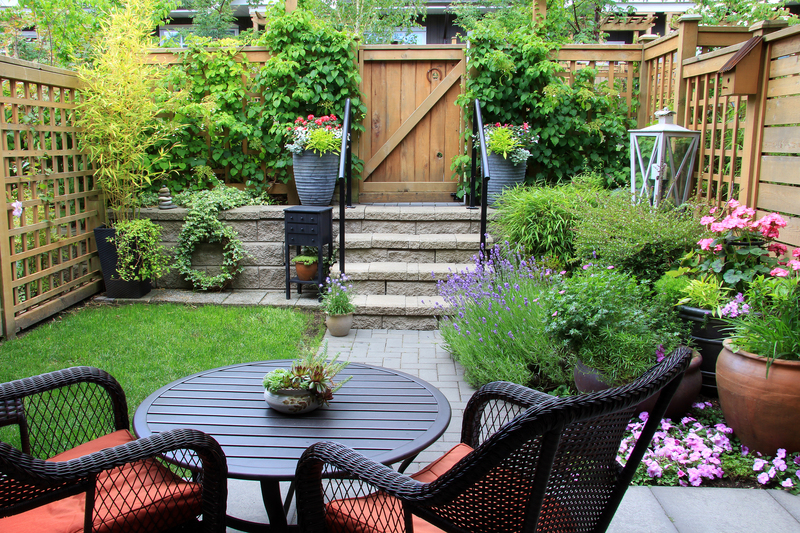Why Eco-Friendly Gardeners Are Climate Change Warriors
Posted on 20/08/2025
Why Eco-Friendly Gardeners Are Climate Change Warriors
In the face of an escalating climate crisis, a new breed of hero has emerged right in our backyards: the eco-friendly gardener. While politicians debate and corporations calculate, these conscientious growers are already fighting global warming--one plant at a time. By adopting sustainable gardening practices, eco-warriors are making profound contributions to the environment, mitigating climate change, enhancing biodiversity, and inspiring their communities. But what makes eco-friendly gardeners true climate change warriors? Let's dig deeper.

The Crucial Connection: Gardening and the Climate
The gardening world may seem far removed from the macro-forces of climate change, but their connection is surprisingly robust. Gardens act as micro-ecosystems. When managed according to sustainable and environmentally friendly principles, these green spaces not only reduce one's own carbon footprint--they also become sanctuaries of biodiversity, climate resilience, and carbon sequestration.
How Climate Change Impacts Gardens
Before exploring how gardeners can help battle climate change, it's important to understand the inverse: how climate change threatens gardens. Rising temperatures, unpredictable rainfall, increased pests, and extreme weather events can devastate crops and ornamental plants alike. As a result, eco-conscious gardeners are on the frontlines, adapting and innovating in real time.
What Is Eco-Friendly Gardening?
Eco-friendly gardening revolves around environmental stewardship. Unlike conventional gardening, which may rely heavily on synthetic pesticides, fertilizers, and excessive resource use, eco-gardeners prioritize:
- Organic soil-building and composting
- Drought-resistant and native plant choices
- Rainwater harvesting and water efficiency
- Natural pest control methods
- Biodiversity support with pollinator habitats
- Elimination of toxic chemicals
These sustainable strategies make eco-gardeners climate change defenders in their own right.
How Eco-Friendly Gardeners Fight Climate Change
So, why exactly do eco-friendly gardeners deserve the title of climate change warriors? The answer lies in the multitude of sustainable gardening actions that directly and indirectly combat climate change. Below, we unpack the powerful role these gardeners play in safeguarding our planet.
1. Enhancing Carbon Sequestration
Soil is one of the largest carbon sinks on Earth. By practicing organic gardening, adding compost, and minimizing soil disturbance, eco-friendly gardeners help trap carbon dioxide in the ground. Trees, shrubs, and perennial plants also lock away huge amounts of carbon, reducing greenhouse gas (GHG) levels in the atmosphere.
- Adding organic matter: Home composting increases soil fertility while reducing landfill waste--a win-win for both soil and sky.
- Minimal-till methods: By disturbing soil less, eco-gardeners preserve soil structure and carbon content.
2. Reducing Chemical Inputs
Synthetic fertilizers and pesticides are major contributors to GHG emissions, water pollution, and biodiversity loss. Sustainable gardening avoids these chemicals, opting for natural methods of soil fertility and pest management.
- Organic fertilizers: Use compost, green manure, and mulch for nutrient-rich soil without fossil-fuel derived chemicals.
- Natural pest control: Encourage beneficial insects, companion planting, and physical barriers instead of sprays.
By choosing eco-friendly gardening strategies, individuals lower their own environmental impact and promote a healthier ecosystem.
3. Saving Water, Fighting Drought
Water scarcity is a growing global crisis exacerbated by climate change. Eco-friendly gardeners rise to the challenge with techniques designed for maximum water efficiency:
- Rainwater harvesting: Collecting rain in barrels or tanks for garden use conserves treated water supplies.
- Drip irrigation & mulching: Targeted watering and soil covers minimize waste and evaporation.
- Drought-tolerant plants: Native and adaptive species require far less water, thriving in shifting climates.
4. Supporting Biodiversity & Pollinators
The decline of bees, butterflies, and other pollinators directly threatens our food systems. Eco-gardeners cultivate habitats packed with nectar-rich native plants, reducing pesticide usage and providing safe havens for wildlife.
- Plant diversity: Diverse plantings attract a broad range of beneficial insects, birds, and more.
- Habitat creation: Pollinator gardens, bug hotels, bird baths, and log piles offer crucial shelter for fauna.
5. Local Food, Lower Carbon Footprint
Growing food at home or in community gardens slashes the "food miles" linked to supermarket produce. By reducing packaging, refrigeration, and transportation emissions, eco-friendly gardeners significantly lower their carbon footprints.
- Zero-mile meals: Fresh, homegrown harvests need no fossil-fueled trucks or planes.
- Seasonal eating: Gardeners learn to cook with what's fresh, further shrinking energy demands.
The Ripple Effect: Inspiring Lasting Change
The actions of an individual may seem small, but the collective impact of hundreds, thousands, or millions of sustainable gardeners is enormous. From local community gardens to online social networks, eco-friendly gardening is spreading awareness, skills, and hope.
Climate warriors don't just change their own habits; they educate neighbors, influence policymakers, and encourage sustainable choices throughout their communities.
Gardeners as Educators and Advocates
Armed with hands-on knowledge, eco-gardeners are often at the frontlines of climate action advocacy:
- Hosting workshops and open gardens to share sustainable techniques
- Organizing composting and seed-saving initiatives
- Participating in local conservation and tree-planting projects
In these ways, eco-friendly gardeners help raise public awareness and empower others to join the global movement against climate change.
Eco-Friendly Gardening: Best Practices for Climate Warriors
The path to becoming an eco-friendly garden warrior for climate change is accessible and rewarding. Here are some practical steps every gardener can take to foster a healthier planet:
1. Prioritize Native & Drought-Tolerant Plants
Native species not only require less water and fertilizer--they're also better adapted to local pests and climatic extremes. By supporting indigenous biodiversity, you make your garden far more resilient to unpredictable weather patterns.
2. Build Soil Health Organically
Start composting kitchen scraps and yard waste, apply organic mulch, and plant cover crops. Healthy, living soil captures carbon and nourishes plants, unlocking a virtuous climate cycle.
3. Minimize Lawn Areas
Lawns demand high water, fertilizer, and mowing. By replacing turf with productive garden beds, pollinator patches, or edible landscaping, you reduce resource use and increase your garden's carbon sequestration capacity.
4. Harvest Rainwater
Install barrels or rain gardens to capture runoff and reduce reliance on potable water. Every drop saved is a drop that's not extracted, treated, or wasted.
5. Practice Organic, Chemical-Free Gardening
Eschew synthetic fertilizers and pesticides. Instead, bolster plant health with compost, beneficial insects, and robust biodiversity. You'll protect water quality and foster a vibrant ecosystem.
6. Support Pollinators Year-Round
Plant a wide array of nectar and pollen sources that bloom in succession. Use no pesticides and provide shelter for bees, butterflies, and birds throughout the year.
7. Consider Your Carbon Footprint
Look for manual or electric tools instead of gasoline-powered options. Buy locally sourced seeds and materials. Reuse and recycle containers, pots, and garden structures.
Eco-Friendly Gardening Success Stories Around the World
Across the globe, climate-conscious gardeners are making headlines--and a difference. Here are just a few inspiring examples:
- London, UK: Urban beekeepers and rooftop food growers fight air pollution and foster biodiversity in the city.
- Nairobi, Kenya: Community gardens replenish soil and provide food security in drought-prone areas.
- Sacramento, USA: Xeriscaping and rain catchment systems help homeowners thrive during severe water restrictions.
- Sydney, Australia: Native wildflower patches attract pollinators and act as natural firebreaks in a warming climate.
Each of these efforts shows how eco-friendly gardens--big or small--play a pivotal role in the climate change battle.
Common Myths About Eco-Friendly Gardening Debunked
As the idea of environmentally friendly gardeners goes mainstream, certain misconceptions persist. Let's address a few:
- "It's expensive." Many steps (like composting, seed-saving, and using rainwater) actually save money over time.
- "It's only for experts." Anyone--regardless of experience--can start with small, sustainable steps and build skills gradually.
- "It's less productive." Diverse, organic gardens often perform as well as or better than conventional ones, thanks to rich soil and balanced ecosystems.
Embracing eco-gardening is both practical and powerful--no superhero cape required!

The Future: Eco-Friendly Gardeners Leading the Charge
As climate changes accelerate, the importance of eco-friendly, climate-positive gardening will only grow. These garden warriors are not just tending their plots--they're sowing hope, resilience, and the seeds of a better world.
Will you join them?
By choosing to be an eco-friendly gardener fighting climate change, you become part of a global solution. Through every compost heap, pollinator bloom, and rainbarrel, you help rewrite the future--one garden at a time.
Conclusion: Planting the Seeds of Change
Eco-friendly gardeners are on the frontlines of climate action, demonstrating that impactful, sustainable choices can begin right outside our doors. By sequestering carbon, conserving water, supporting wildlife, and empowering others, these individuals prove that everyone has a role in combating global warming.
Next time you pick up a trowel, remember: you're not just growing plants; you're joining a growing movement of climate change warriors. Let's cultivate not just gardens, but a more sustainable, hopeful planet for generations to come.
Are you ready to be an eco-friendly gardener and climate change warrior?
Latest Posts
Harness the power of vertical gardening
Top Picks: Garden Tools for Outdoor Enthusiasts
Shield Your Garden from Winter's Chill

